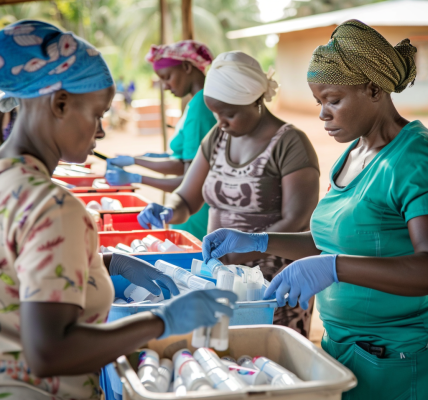Understanding Mpox: A New Variant Raises Concerns
Mpox, previously known as monkeypox, is a zoonotic disease caused by the mpox virus, which belongs to the Orthopoxvirus genus. This disease is primarily transmitted through close contact with infected animals or individuals. The term “monkeypox” originates from the virus’s initial discovery in monkeys at a Danish laboratory in 1958, although the primary carriers of the virus are rodents found in Central Africa. The first recorded human case of mpox was documented in the Democratic Republic of Congo in 1970.
The symptoms of mpox can be quite severe and include swollen lymph nodes, skin eruptions or lesions, headaches, body pain, weakness, fever, and chills. Transmission can occur through various means, including being scratched or bitten by an infected animal, engaging in skin-to-skin contact with symptomatic individuals, direct contact with bodily fluids or wounds of an infected person, and even through contact with contaminated objects such as clothing, towels, and cutlery.
Global Awareness of Mpox
The disease gained international attention in 2022 when the Clade II variant began to spread rapidly across Western Africa. This particular variant was noted for its increased infectiousness compared to earlier strains and was characterized by rashes primarily appearing on the face, mouth, and genital regions. The spread of this variant was notably linked to sexual contact among infected individuals.
During the initial outbreak, cases were predominantly reported among men aged 18 to 34, particularly those with active sexual lifestyles and multiple partners. Fortunately, the Clade II variant was associated with a low lethality rate, with a survival rate of approximately 99% among confirmed cases.
As the number of cases began to rise outside Africa, the World Health Organization (WHO) declared mpox a Public Health Emergency of Global Importance. This declaration served as a crucial warning to countries worldwide about the potential risks associated with the dissemination of this new variant, prompting nations to implement measures to control its spread.
Thanks to the swift development of vaccines and treatment options, the global community was able to manage the outbreak effectively. As a result, the Clade II variant has not shown a significant increase in cases globally. According to WHO data, from the onset of monitoring in 2022 until July 31, 2024, there have been 102,977 confirmed cases of mpox attributed to the Clade II variant, resulting in 219 deaths reported across 121 countries.
Emergence of a New Variant
In 2024, mpox once again captured global attention with the emergence of a new variant. This development has raised concerns among health officials and the public alike, prompting discussions about the potential for this new strain to evolve into a larger public health crisis.
The scientific community is closely monitoring this new variant, analyzing its transmission patterns and potential impact on global health. Health experts emphasize the importance of continued vigilance and public awareness in order to mitigate the risks associated with mpox.
Preventative measures, including vaccination campaigns and public health initiatives, are being reinforced to ensure that communities remain protected against the spread of mpox. Health organizations are also focusing on educating the public about the symptoms and transmission methods of the disease to promote early detection and treatment.
The emergence of the new variant serves as a reminder of the ever-evolving nature of infectious diseases and the necessity for global cooperation in addressing potential health threats. As researchers continue to study the characteristics of this new strain, the emphasis remains on preparedness and response strategies to effectively manage any future outbreaks.
Health authorities are urging individuals to remain informed and to follow recommended health guidelines to reduce the risk of transmission. This includes practicing good hygiene, avoiding close contact with symptomatic individuals, and seeking medical advice if symptoms arise.
As the situation develops, the global health community is committed to sharing information and resources to ensure that countries are equipped to handle the challenges posed by mpox and its variants.
In summary, the ongoing situation surrounding mpox highlights the importance of public health vigilance and the need for continued research and education to combat infectious diseases. The emergence of new variants necessitates a proactive approach to health management, ensuring that communities are prepared for any potential health crises in the future.





